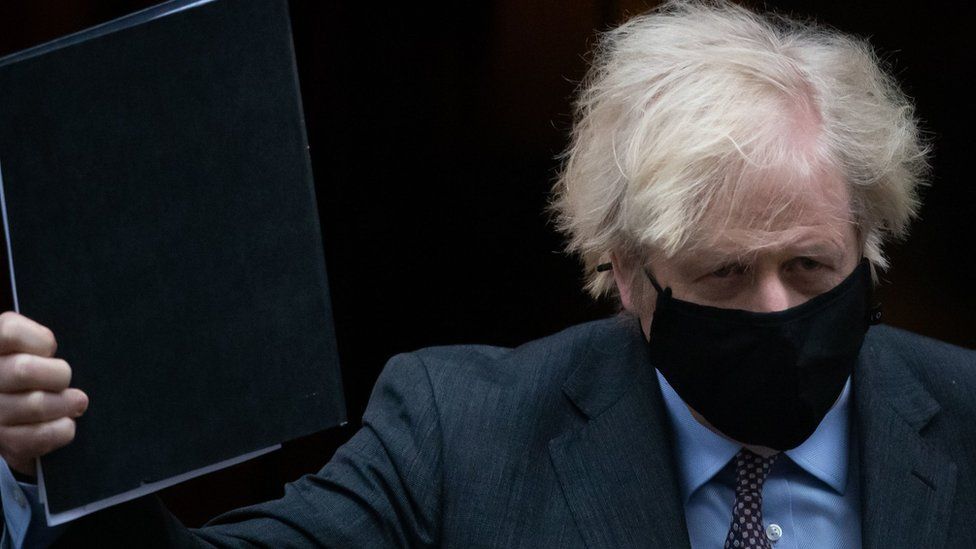Covid-19: Boris Johnson plans to reopen shops and gyms in England on 12 April
 image copyrightPA Media
image copyrightPA MediaShops, hairdressers, gyms and outdoor hospitality will reopen on 12 April in England if strict conditions are met, under plans being set out by the PM.
Up to six people from separate households could be able to meet in beer gardens from that date.
The new four-step plan to ease lockdown could see all legal limits on social contact lifted by 21 June.
It requires four tests on vaccines, infection rates and new coronavirus variants to be met at each stage.
Prime Minister Boris Johnson told MPs the plan aimed to be "cautious but irreversible" and at every stage decisions would be led by "data not dates".
But he warned there was "no credible route to a zero-Covid Britain nor indeed a zero-Covid world".
It comes as the first data on the UK's coronavirus vaccine rollout suggests it is having a "spectacular" impact on stopping serious illness.
Step-by-step
As part of the first step of the plan for easing lockdown in England:
- From 8 March - All schools will open with outdoor after-school sports and activities allowed. Recreation in an outdoor public spaces - such as a park - will be allowed between two people, meaning they would be allowed to sit down for a coffee, drink or picnic
- From 29 March - Outdoor gatherings of either six people or two households will be allowed. It is understood this will include gatherings in private gardens. Outdoor sports facilities such as tennis or basketball courts will reopen and organised adult and children's sport, such as grassroots football, will also return
Secondary school pupils will be required to wear face coverings in classrooms and shared spaces like corridors.
The second step from 12 April would see major parts of the economy permitted to reopen:
- Non-essential retail opens, hairdressers and public buildings like libraries and museums
- Outdoor settings like alcohol takeaways, beer gardens, zoos and theme parks
- Indoor leisure like swimming pools and gyms
- Self-contained holiday accommodation, such as self-catering lets and camp sites
But wider social contact rules will continue to apply in all settings - meaning no indoor mixing between different households will be allowed.
Mr Johnson confirmed the end of hospitality curfews - and requirements to eat a substantial meal alongside alcohol.
Funerals continue with up to 30 people, and weddings with up to 15 guests.
The third step will come from 17 May - if the data allows - and will see the "rule of six" abolished for outdoor gatherings, replaced with a limit of 30 people:
- Two households can mix indoors - with the rule of six applied in hospitality settings like pubs
- Cinemas, hotels, performances and sporting events reopen - though social distancing remains
- Up to 10,000 spectators can attend the very largest outdoor seated venues like football stadiums
Up to 30 people will be able to attend weddings, receptions, funerals and wakes.
The fourth step from 21 June will potentially see all legal limits on social contact removed, with the final closed sectors of the economy reopened - such as nightclubs.
The government hopes that - from this date - restrictions on weddings and funerals will also be abolished.
Must pass tests
The four conditions that must be met at each phase of lockdown easing are:
- The coronavirus vaccine programme continues to go to plan
- Evidence shows vaccines are sufficiently reducing the number of people dying with the virus or needing hospital treatment
- Infection rates do not risk a surge in hospital admissions
- New variants of the virus do not fundamentally change the risk of lifting restrictions

- LOOK-UP TOOL: How many cases in your area?
- YOUR QUESTIONS: We answer your queries
- GLOBAL SPREAD: How many worldwide cases are there?
- THE R NUMBER: What it means and why it matters
- TEST AND TRACE: How does it work?

The devolved nations have the power to set their own restrictions but have largely moved in the same direction, though at different speeds, during the pandemic.
First Minister Nicola Sturgeon has said Scotland would return to a tiered system of restrictions when lockdown measures are eased, meaning different parts of the country could be under different rules. She added that she would set out the likely phases for a gradual lifting of restrictions on Tuesday.
In Wales, First Minister Mark Drakeford has said he hopes the "stay-at-home" requirement could end within three weeks, with some non-essential shops and hairdressers possibly reopening at the same time.
Northern Ireland's health minister has played down the prospect of restrictions being eased in time for Easter. A review of current measures will take place on 18 March.

- BBC HEADROOM: Your mental health toolkit - Mindful tips, mood mixes and motivation
- 'I WANT PEOPLE TO TALK': West Ham Women captain opens up on mental health



No comments